英语句子重读(转载)
句子重读、连读、意群、语调

重读、连读、意群、语调
英语句子重读、连读、意群、语调
一、句子重读(读英语句子时,有些词读得重而清晰,有些读得轻而含糊。)
1、实词(名/形/副/数和实义动词)要重读。虚词(介/冠/连词和人称/关系代词等)不重读。
1/.The new book is on the desk.
2、感叹词和疑问词要重读。 1/.How hot it is today!
2/.I am so busy with my school-work and duties as monitor that I don’t have enough time to keep a balance between them .
四、语调 1、升调的使用 1/.Are you waiting for someone?↗ (一般疑问句)
I canቤተ መጻሕፍቲ ባይዱt come.
Stop talking.
三、意群与停顿:(在说话或朗读时,为了换气或将意义表达清楚,一个较长的句子可根据意思与语法结构划分为 若干部分,每一个部分被称为一个意群。意群之间可稍微停顿,但同一意群里的单词要一口 气读完。) 1/.He woke up at a quarter past six this morning.
2/.One,↗ two,↗ three,↗ four,↗ five.↘ (数数) 3/.We bought some sugar,↗ some vegetables↗ and two bottles of beer.↘ (列举事务) 2、降调的使用 1/.What do you plan to do this weekend?↘ (特殊疑问句) 2/.The train started out two minutes ago.↘ (陈述句) 3/.Please ask him to come in.↘ (祈使句) 4/.What a fine day!↘ (感叹句) 3、特殊类 1/.Are you a Chinese ↗ or a Japanese?↘ (选择疑问句,前升后降。)
英语句子的重音规则

什么是句子重音我们在朗读英语或用英语交谈时,并不是句子中的每个词都读得一样响亮;一样清楚,而是有些词读得或说得又轻又快,而且较为含糊,有些词则读得或说得又重又慢,而且较为清晰;那些读得或说得响亮而清晰的词就是句子重音所在;句子重音的功能1.体现句子的节奏感和韵律感;2.突出重点,使听者更容易理解;哪些词在句子中需重读1.一般来说,在句子中需重读的词都是实词,比如,名词、动词、形容词、副词、数词、代词等;不重读的多为虚词,比如,冠词、连词、介词、感叹词等;The streets are wide and clean. 这句话中的streets是名词,wide和clean是形容词,它们都要重读;the, are, and不重读;I am so glad to see you again. 这句话中的so, glad, see, again要重读,而I, am, to, you不重读;2.有时候虚词也要重读,以下几点需注意:We saw him playing by the river.这句话中的we和him一般不重读,但为了表示强调也可以重读;比如,如果we重读,则强调是我们而不是别人看见;2介词在句首时往往要重读;例如:On my way to school, my bike was broken. 这句话中的on 在句首应重读;3be动词及助动词和not结合时要重读;例如:Im sorry I cant do that. 这句话中的cant要重读;Didnt I tell you yesterday 这句话中的didnt要重读;4句子末尾的be动词和助动词一般要重读;例如:注意:上文刚出现过的并且重读的单词,第二次提到时一般不再重读如:-How many boys are there in the room -There are twenty boys in it. 问句中的boys要重读,但答语中的boys不重读;。
英语句子的重音详解

• Must I stick it on myself? • Must I ‘stick it ‘on my’self? • Must I ‘stick it on my’self?
1
• ‘What ‘s the ‘matter? • The ‘sweater is ‘beautiful. • Your ‘book is on the ‘desk. • He ‘started ‘counting it. • He ‘usually ‘gets up at ‘six o’clock.
'sister.
8
形容词(包括分词作形容词)一般都应重读 数词一般都应重读
The 'streets are 'wide, 'clean and 'beautiful. 'This 'narrow 'valley was the 'scene of a
'famous 'battle. His 'first daughter is fif'teen. It’s a 'dull and disap'pointing film. 'That’s ex'citing news. The 'worried man 'entered the 'crowded 'street. He 'bought 'ten 'cups and 'I bought only 'four.
'Who 'came to 'see you this 'morning?
重读连读
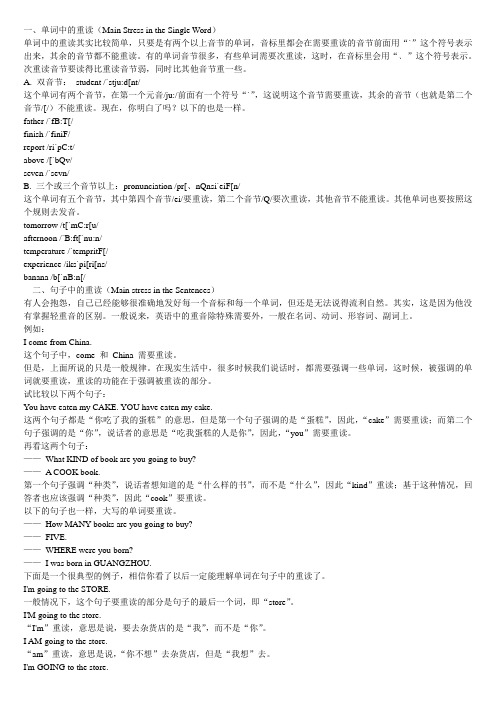
一、单词中的重读(Main Stress in the Single Word)单词中的重读其实比较简单,只要是有两个以上音节的单词,音标里都会在需要重读的音节前面用“`”这个符号表示出来,其余的音节都不能重读。
有的单词音节很多,有些单词需要次重读,这时,在音标里会用“﹑”这个符号表示。
次重读音节要读得比重读音节弱,同时比其他音节重一些。
A. 双音节:student /`stju:d[nt/这个单词有两个音节,在第一个元音/ju:/前面有一个符号“`”,这说明这个音节需要重读,其余的音节(也就是第二个音节/[/)不能重读。
现在,你明白了吗?以下的也是一样。
father /`fB:T[/finish /`finiF/report /ri`pC:t/above /[`bQv/seven /`sevn/B. 三个或三个音节以上:pronunciation /pr[、nQnsi`eiF[n/这个单词有五个音节,其中第四个音节/ei/要重读,第二个音节/Q/要次重读,其他音节不能重读。
其他单词也要按照这个规则去发音。
tomorrow /t[`mC:r[u/afternoon /`B:ft[`nu:n/temperature /`tempritF[/experience /iks`pi[ri[ns/banana /b[`nB:n[/二、句子中的重读(Main stress in the Sentences)有人会抱怨,自己已经能够很准确地发好每一个音标和每一个单词,但还是无法说得流利自然。
其实,这是因为他没有掌握轻重音的区别。
一般说来,英语中的重音除特殊需要外,一般在名词、动词、形容词、副词上。
例如:I come from China.这个句子中,come 和China 需要重读。
但是,上面所说的只是一般规律。
在现实生活中,很多时候我们说话时,都需要强调一些单词,这时候,被强调的单词就要重读,重读的功能在于强调被重读的部分。
英语句子重读、连读、意群、语调
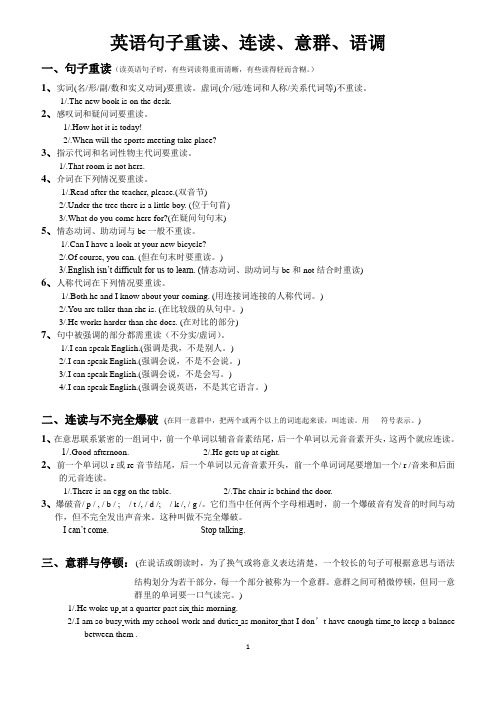
英语句子重读、连读、意群、语调一、句子重读(读英语句子时,有些词读得重而清晰,有些读得轻而含糊。
)1、实词(名/形/副/数和实义动词)要重读。
虚词(介/冠/连词和人称/关系代词等)不重读。
1/.The new book is on the desk.2、感叹词和疑问词要重读。
1/.How hot it is today!2/.When will the sports meeting take place?3、指示代词和名词性物主代词要重读。
1/.That room is not hers.4、介词在下列情况要重读。
1/.Read after the teacher, please.(双音节)2/.Under the tree there is a little boy. (位于句首)3/.What do you come here for?(在疑问句句末)5、情态动词、助动词与be一般不重读。
1/.Can I have a look at your new bicycle?2/.Of course, you can. (但在句末时要重读。
)3/.English isn’t difficult for us to learn. (情态动词、助动词与be和not结合时重读)6、人称代词在下列情况要重读。
1/.Both he and I know about your coming. (用连接词连接的人称代词。
)2/.You are taller than she is. (在比较级的从句中。
)3/.He works harder than she does. (在对比的部分)7、句中被强调的部分都需重读(不分实/虚词)。
1/.I can speak English.(强调是我,不是别人。
)2/.I can speak English.(强调会说,不是不会说。
)3/.I can speak English.(强调会说,不是会写。
英语重读规则
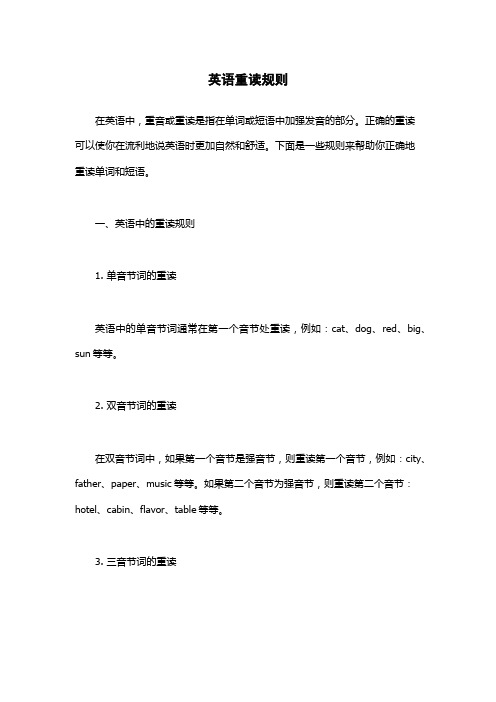
英语重读规则在英语中,重音或重读是指在单词或短语中加强发音的部分。
正确的重读可以使你在流利地说英语时更加自然和舒适。
下面是一些规则来帮助你正确地重读单词和短语。
一、英语中的重读规则1. 单音节词的重读英语中的单音节词通常在第一个音节处重读,例如:cat、dog、red、big、sun等等。
2. 双音节词的重读在双音节词中,如果第一个音节是强音节,则重读第一个音节,例如:city、father、paper、music等等。
如果第二个音节为强音节,则重读第二个音节:hotel、cabin、flavor、table等等。
3. 三音节词的重读在三音节词中,如果第一个音节是强音节,则重读第一个音节,例如:banana、bicycle、computer、invisible等等。
如果第二个音节是强音节,则重读第二个音节,例如:delightful、electricity、introduce、remember等等。
如果第三个音节是强音节,则重读第三个音节:vocabulary、geography、photography等等。
4. 复合词和短语的重读在复合词和短语中,通常重读第一个单词,例如:blueberry、blackboard、headache、worldwide等等。
二、重音对意思的影响重读一个单词或短语的不同音节,可能会改变它的意义。
以下是一些例子:1. present 和 pre-sentPresent (礼物)是重读第二个音节; pre-sent(呈现)是重读第一个音节。
2. contract 和 con-tractContract(合同)是重读第一音节;con-tract(减少)是重读第二个音节。
3. Pro-duce 和 prO-ducePro-duce(生产)是重读第一音节;prO-duce(农产品)是重读第二个音节。
4. Pho-to 和 photo-gra-phyPho-to(相片)是重读第一音节;photo-gra-phy(摄影)是重读第二个和第四个音节。
英语听说训练:句子的重读

名词、实义动词、形容词、副词、数词、指示代词、疑问词和感叹词等一般都重读。
而冠词、介词、连词和一般性的代词等则不重读。
1. ‘What’s the ‘matter?2. The ‘skirt is ‘beautiful.3. Your ‘book is on the ‘desk.4. He ‘usually ‘gets up at ‘six o’clock.1、名词I have a ‘book and a ‘pen.There are ‘ups and ‘downs in ‘life.形容词+名词的词组,有些形容词重读,有些是形容词和名词都重读‘good ‘time ‘good ‘idea ‘busy ‘time ‘strong ‘tea ‘sharp ‘knife ‘middle school ‘black tea ‘primary school‘Labour Day ‘social work 2、形容词He is ‘handsome. It is a ‘new ‘radio. It’s a ‘good ‘day.3、动词实意动词重读She can ‘sing and ‘dance. We ‘study and ‘work for our ‘family.情态动词、助动词、动词be、动词have一般不重读I have ‘two ‘sisters. He can ‘swim. ‘This is a ‘book.4、副词‘Come ‘on!‘Stand ‘up! ‘Sit ‘down! They ‘work ‘hard.5、数词‘Class be‘gins at ‘eight.There are ‘three ‘rooms on the ‘third ‘floor.6、代词人称代词、形容词性物主代词、不定代词some/any,一般不重读We ‘love our ‘country. ‘This is your ‘book. I ‘want some ‘paper.名词性物主代词、指示代词和疑问代词,重读‘That is ‘your book, not ‘mine.(这里your 与mine对照,所以有重音) The ‘red one is ‘hers.‘What is there on the ‘desk?7、感叹词‘Oh, it’s ‘you! (这里you 需强调,有重音)‘Hey, be ‘quick!一、助动词、情态动词和be动词一般不重读,但在附加句中可重读,在 简答句中须重读:1. He will ‘do it, ‘won’t he? No he ‘won’t.2. You can ‘do it, ‘can’t you? Yes, I ‘can.3. You were ‘trying, ‘weren’t you? Yes, I ‘was.注:can’t /kɑːnt/ won’t /wəʊnt/ isn’t /'ɪznt/ weren’t /wɜ:nt/ wasn’t /'wɒznt/二、助动词、情态动词和be动词与not连成一词时要重读:1. She ‘doesn’t ‘like the ‘weather here.2. I ‘can’t ‘speak ‘French.3. They ‘aren’t ‘waiting for us.4. He ‘isn’t a tech‘nician.三、be用在一般疑问句句首时,重读与否均可:1. ‘Is he a ‘worker?2. Is he a ‘worker?四、比较句中,重音落在as或than后的代(名)词上:1. This is better than ‘that.2. She’s as happy as a ‘lark.3. John is taller than ‘Peter.4. He’s as sly as a ‘fox.五、逻辑重音:根据说话人所要表达的重点,为了强调,几乎任何词都可以有句子重音。
英语句子重读规则说课讲解

否定助动词
DON'T, AREN'T, CAN'T
重读
虚词的种类
例如
在句子中是否重读
为语法而存在的词
代词
he, we, they
介词
on, at, into
冠词
a, an, the
连词
and, but, because
助动词
do, be, have, can, must
二、特殊规则:
1、但是有时候根据需要也要重读个别虚词,
例如:
"They've been to Mongolia, haven't they?"
"No,THEYhaven't, butWEhave.
2、此外,Be即使是主要动词,也不应当重读。
3、根据句子所要表达的侧重意思确定重读的词
英语句子重读规则
英语句子重读规则
一、重读一般规则如下:1.实词重读2.虚词弱读
实词的种类
例如
在句子中是否重读
本身具有意义的词
主要动词
SELL, GIVE, EMPLOY
重读
名词
CAR, MUSIC, MARY
重读
形容词
RED, BIG, INTERESTING
重读
副词
QUICKLY, LOUDLY, NEVER
句子重音
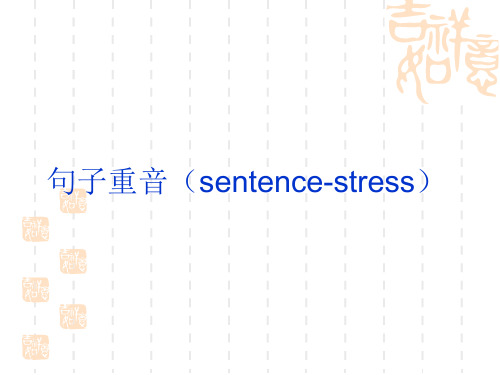
语调
▪ 英语语调主要有降调、升调和平调三大类。 ▪ 不同的语调可以表示说话人不同的态度和
不同的隐含意思。 ▪ 英语中同一句话采用不同的语调会产生截
然不同的语意概念。如“Yes” ▪ 语调具有强烈的感情色彩,它使语言更富
有表现力。
▪ 降调 ▪ 用于陈述句 ▪ I have already read that book. ↘ ▪ That street is two miles long. ↘ ▪ 用于特殊疑问句 ▪ What has happened to him? ↘ ▪ Which direction is it to the post office? ↘ ▪ 注意:特殊疑问句有时可用升调表示请别人重复
and English. ↘ ▪ Such as water , tea ,coffee ,and juice ▪ 用于陈述句,表示疑问、怀疑、未定、猜测或
期待等
▪ Your really want to do it? ↗ ▪ She might have gone. ↗ ▪ I think so. ↗
2.凡是有强读和弱读的词,一般词典中都有音标,有些词的弱式 有两种或多种发音,列在最后面的最弱。 下面所列举的仅是其中最常用的一部分。
1)特殊动词(系动词、助动词和情态动词)
2) 代词
3) 冠词、介词、连词 4ቤተ መጻሕፍቲ ባይዱ 其他
省略元音的弱式,例如: have/v/; had/d/; should ; will/l/; and/n/通常用于元音结尾的词之后。
▪ ‘What ‘s the ‘matter? ▪ The ‘sweater is ‘beautiful. ▪ Your ‘book is on the ‘desk. ▪ He ‘started ‘counting it. ▪ He ‘usually ‘gets up at ‘six o’clock.
Sentence-Stress--语句重音

Sentence Stress 语句重音(一)语句重音指的是人们在朗读连贯的语句时哪些词要重读哪些词不重读的规则。
下面介绍的是有关语句重音的最一般的但却是最重要的规则:(一)在连贯的语句中需要重读的词有:名词、形容词、数词、实义动词、副词、某些代词(指示代词等)、疑问词、叹词等。
这条规则可以用四个词来总结:实词重读。
1)名词一般情况下名词在句中应重读。
例如:An elephant is an animal.(大象是一种动物)2)形容词一般都有语句重音。
如:Her shirt is blue and white.(她的裙子是蓝、白色)3)数词分为基数词和序数词,两者在句中都应重读。
例如:John is nine.(约翰9岁)My second brother is a doctor.(我的二哥是个医生)4)实义动词实义动词有完整的意义,能在句中作谓语,一般都有语句重音。
例如:Mary loves her dolls.(玛丽爱她的洋娃娃)She sings well.(她很会唱歌)5)副词大都在句中要重读。
如:speaks English slowly and carefully.(他说起英语来又慢又小心)(6)代词指具有语句重音的代词,如①指示代词:this, that, these, those ②返身代词:myself, yourself, himself 如:He himself hurt his own feet.(是他自己伤着了自己的脚)③不定代词:some, every, all, both, none, other, many, few, somebody, something等等。
如:Everybody was late.(每个人都迟到了)We are many, they are few. (我们人多,他们人少。
) Some are red, some are blue.(有一些是红色的,有些是蓝色的)④疑问代词:who, whom, whose, what, which等。
英语发音练习——句子重读
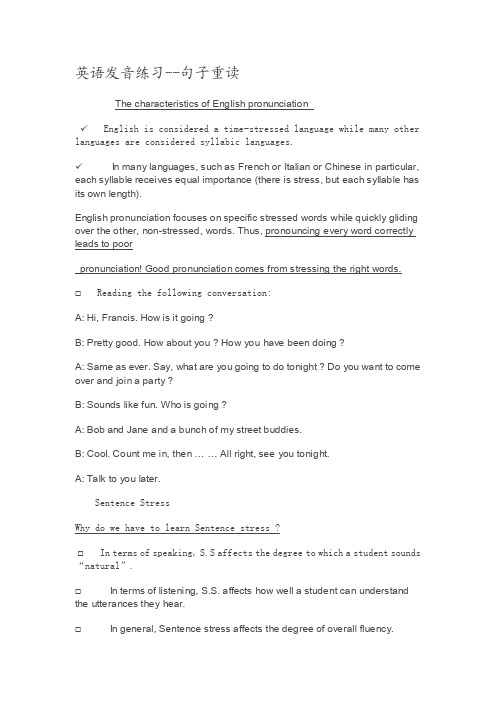
英语发音练习--句子重读The characteristics of English pronunciation✓ English is considered a time-stressed language while many other languages are considered syllabic languages.✓In many languages, such as French or Italian or Chinese in particular, each syllable receives equal importance (there is stress, but each syllable has its own length).English pronunciation focuses on specific stressed words while quickly gliding over the other, non-stressed, words. Thus, pronouncing every word correctly leads to poorpronunciation! Good pronunciation comes from stressing the right words.☐ Reading the following conversation:A: Hi, Francis. How is it going ?B: Pretty good. How about you ? How you have been doing ?A: Same as ever. Say, what are you going to do tonight ? Do you want to come over and join a party ?B: Sounds like fun. Who is going ?A: Bob and Jane and a bunch of my street buddies.B: Cool. Count me in, then … … All right, see you tonight.A: Talk to you later.Sentence StressWhy do we have to learn Sentence stress ?☐ In terms of speaking, S.S affects the degree to which a student sounds “natural”.☐In terms of listening, S.S. affects how well a student can understand the utterances they hear.☐In general, Sentence stress affects the degree of overall fluency.How Sentence Stress works (句子重读的讲解)☐In any given sentence in English there will be words that carry stress and others that don’t.☐Stressed words carry the meaning or the sense behind the sentence, and for this reason they are called “Content Words” (实义词)- they carry the content of the sentence.☐Unstressed words tend to be smaller words that have more of a grammatical significance - they help the sentence “function” syntactically and for this reason they are called “Function Words”(辅助词)月16日周三英语发音练习--句子重读(二)(2006-09-15 10:02:01)转载分类:ignitertime专栏Content Words include:Nouns(名词) ( chair / Peter )Principle verbs(主动词)(visit / go)Adjectives(形容词)(beautiful / interesting)Adverbs(副词)(often / carefully)Interrogatives(疑问词)( what/why/whose/who/when/where/how/how many )Other Stressed words include:(其他重读)1.this, that和these, those等指示代词后面不跟名词时要重读.What’s this ? Why are these here ?2. mine, yours, his, hers, ours, theirs等名词性物主代词要重读This is yours. That’s mine.David sold his.3. can’t , don’t , doesn’t , couldn’t , shouldn’t , mustn’t这些词需重读I can’t do it. He doesn’t want to go. He shouldn’t be like that.Function Words include:Pronouns(代词) ( I / you /he /she /it /they /we )Possessive Pronouns(物主代词)( my / your / our / their / its / his /her )Object Pronouns(做宾语的人称代词)( me / him / her / us / them / it / you )Prepositions(介词)( under / on / of / to … )Articles(冠词)( the / a / an )Conjunctions(连词)( and / but / if /although / until / since / or )Other Unstressed words include:(其他弱化)1.This, that, those, these后面跟名词时不重读I love those guys. This book is interesting.2. can, must, should, could, have to, would, might, need等形态动词不重读I must go. I would better run now.3.除以上所指外的所有辅助动词都不重读am/is/are/isn’t/aren’t/wasn’t/weren’t/do/does/have/has/hasn’t/haven’t/didn’t/did …I am working in the house. He has to work on Sundays.Why does he travel so much ? He isn’t the best person.4.在句子中间的who, whose, when, where, why, what, how不重读Do you know where she lives ? I know how to do it.5.There is, there are不重读There’s a car in our garden.Read the conversation again !A: Hi, Francis. How is it going ?B: Pretty good. How about you ? How you have been doing ?A: Same as ever. Say, what are you going to do tonight ? Do you want to come over andjoin a party ?B: Sounds like fun. Who is going ?A: Bob and Jane and a bunch of my street buddies.B: Cool. Count me in, then … … All right, see you tonight.A: Talk to you later.I am talking to all those students.You’re sitting on the desk, but you aren’t listening to me.He’s writing quickly, so it’s difficult for him to hear me.My name is John, I’m the best student in the class.Practice:When will Mark come for the party ?He’s sitting in his chair.I’m doing my homework.I have to go, I think.What do you think ?I often visit parks during the Weekend.What do you want to do ?There are many flowers in our school.I love to work for this company.He has to got to hurry, because he is late.Could you speed it up, please ?Would you mind if I tried it ?Tell him that I miss him.Where are you from ?How old is that boy ?You would better go home and don’t go out anymore.Do you want to come over tonight ?Can’t you see it my way for a change ?Do you want to dance ?I’m going to have to get up early 语言部分学习--PRAISE(赞扬) Conversation 1:A: It does you full credit(满分,了不起)to answer these very difficult questions all by yourself.独自的I praise you very highly indeed.没有实义,只表示强调B: Thanks for your praise, Tom. In fact, I just do what I have to do.我只做了我应该做的事A: Jane, y ou’re really an honorable可敬的person. You always do well做得好in studies学业but never take pride骄傲(贬义:cocky)in your success.B: Tom, I’m flattered. I believe where there’s a will, there’s a way有志者事竟成. As long as只要you work hard, nothing is impossible.A: Th at’s very true. Ok, I guess I’ll have to go. It was very nice talking to you.B: Me, too. Bye.A: Talk to you later.Conversation 2:A: I really admire you.我真佩服你Your speech was wonderful.B: Oh, thank you ! How sweet of you to say so !A: It’s a real chal lenge to speak in front of so many people, but you did it. I’ve got to hand itto you.双手祝贺你You were great.B: I’m flattered !Conversation 3:A: You look gorgeous长相穿着物品in that new dress.B: Oh, really !A: Oh, yeah. I have to say you really have an eye for beauty你眼力真好. It’s the most beautiful dress I’ve ever seen.B: Thanks for saying so. You’re so sweet.女孩子说Conversation 4:A: Nice work,好样的man. Your project is really awesome. I’d like to compliment you on that.B: Thanks for your compliment. Actually, I was just doing my job. I owe it多亏all to my colleagues who helped me so much.A: Well, anyway, congratulations !B: I really appreciate it.=thank you very much(anyway无论如何、 though不过、 you know)my apologies=sorrytomorrow morning.句子朗读中关注的问题句子在朗读过程中,一般会关注到以下几个方面,句子的重读,连读,语调。
英语句子重读规则

一、重读一般规则如下:1.实词重读2.虚词弱读
实词的种类
例如
在句子中是否重读
本身具有意义的词
主要动词
SELL, GIVE, EMPLOY
重读
名词
CAR, MUSIC, MARY
重读
形容词
RED, BIG, INTERESTING
重读
副词
QUICKLY, LOUDLY, NEVER
重读
例如:
"They've been to Mongolia, haven't they?"
"No,THEYhaven't, butWEhave.
2、此外,Be即使是主要动词,也不应当重读。
3、根据句子所要表达的侧重意思确定重读的词
否定助动词
DON'T, AREN'T, CAN'T
重读
虚词的种类
例如
在句子中是否重读
为语法而存在的词
代词
he, we, they
பைடு நூலகம்介词
on, at, into
冠词
a, an, the
连词
and, but, because
助动词
do, be, have, can, must
二、特殊规则:
1、但是有时候根据需要也要重读个别虚词,
英语句子的重音

2.不重读的代词有:人称代词,物主代词(形容 词性),相互代词,关系代词
He 'hasn’t 'seen my 'brother yet. He 'hurt himself when he was 'playing 'football. They 'often 'help each other. The 'girl who 'spoke to you just 'now is my
20
连接代词who (whom, whose) what, which 和连接 副词when, where, how, why 可以重读,也可以不 重读。 I 'wonder 'who 'that was. 'Ask him 'which is 'better. I 'don’t 'know 'how they 'are. I 'don’t 'know how 'things are in 'their 'school. I’m 'not sure 'when he’s 'coming. I 'can’t under'stand 'why he re'fuses to 'go. Do you 'see what I 'mean? He 'doesn’t know 'what he should 'do 'next.
16
Notes: 助动词和情态动词与not构成的缩略式 要重读
I 'don’t want to 'go there to'day. He 'wasn’t sur'prised when I 'told him the 'news. We 'can’t 'stay any 'longer. 'Don’t you think you 'shouldn’t say 'such things We must 'do it 'now, 'mustn’t we?
最新关于英语句子的重音和语调

关于英语句子的重音和语调关于英语句子的重音和语调句子重音,即句子的某些单词需要重读。
句子里需要重读的主要是实词,而表示语法关系的虚词或功能词无需重读无须重读。
一般来说,句子中的名词、动词(助动词,如do 、does、 did 、will/shall、has/had等、情态动词。
如can /may 等和be动词例外)、形容词、副词和数词需要重读;代词(指示代词和疑问代词,如this,these,that,those,which,what,who,whom,whose等例外)、介词,如at、 in、on、for 、about 等、冠词,如a、an、the、连词,如but、and、so、or 等和感叹词,如,hello、well、oh、ah、why、hey、aha等不需要重读。
所有的句子是否都根据此规则去做就可以了呢?不行,还要根据具体的语言环境分析对待。
如上句中使用过的词,下句中紧接着再出现而不强调时,一般不重读,但特别强调时要重读。
下面举例说明:根据对话的情景,找出划线部分一般重读的单词。
①—Do you speak English?—No, I don't speak English.A. No, I, speakB. don't, speak, EnglishC. No, don'tD. No, I, speak, English解:根据一般规律,实词重读、虚词不重读。
但从具体情况来看,speak,English 均属第二次出现的不再传达新信息的实词,未被强调,不需重读,yes要重读,它传达了很重要的信息。
故排除A、B、D,答案C。
②—What does Xiao Li do?—He is a teacher like me.A. teacher, meB. teacher, likeC. teacher, like, meD. teacher解:按一般规则,人称代词不重读。
- 1、下载文档前请自行甄别文档内容的完整性,平台不提供额外的编辑、内容补充、找答案等附加服务。
- 2、"仅部分预览"的文档,不可在线预览部分如存在完整性等问题,可反馈申请退款(可完整预览的文档不适用该条件!)。
- 3、如文档侵犯您的权益,请联系客服反馈,我们会尽快为您处理(人工客服工作时间:9:00-18:30)。
英语句子重读
在一般情况下句子重读的规律:在句子中比较重要的词都要重读,使这个词的发音响亮而清晰。
在句子中需要重读的词有名词、动词、形容词和副词。
冠词、连接词、介词、助动词和人称代词等所谓的虚词,一般都不要重读,但当助动词、介词和代词放于句首时,助动词置于句尾时要重读。
在句子中每个重读音节间相隔的时间大致相等的,在重读音节之间的弱读音节要读得较快一些,好像是音乐中的打拍子一样。
在学习句子的读法时,特别要体会一轻一重或一重一轻的节奏感。
句子重音的功能
1.体现句子的节奏感和韵律感。
2.突出重点,使听者更容易理解。
哪些词在句子中需重读
1.一般来说,在句子中需重读的词都是实词,比如,名词、动词、形容词、副词、数词、代词等。
不重读的多为虚词,比如,冠词、连词、介词、感叹词等。
例如:
The streets are wide and clean. (这句话中的streets是名词,wide和clean是形容词,它们都要重读;the, are, and不重读。
)
I am so glad to see you again. (这句话中的so, glad, see, again要重读,而I, am, to, you不重读。
)
2.有时候虚词也要重读,以下几点需注意:
1)强调或突出某个虚词或be动词时,应将其重读。
例如:
We saw him playing by the river.(这句话中的we和him一般不重读,但为了表示强调也可以重读。
比如,如果we重读,则强调是#我们#而不是别人看见。
)
2)介词在句首时往往要重读。
例如:
On my way to school, my bike was broken. (这句话中的on在句首应重读。
)
3)be动词及助动词和not结合时要重读。
例如:I]m sorry I can]t do that. (这句话中的can]t要重读。
)
Didn]t I tell you yesterday (这句话中的didn]t要重读。
)
4)句子末尾的be动词和助动词一般要重读。
例如:
-Are you a student -Yes, I am. (这里的am要重读。
)
注意:上文刚出现过的并且重读的单词,第二次提到时一般不再重读如:
-How many boys are there in the room -There are twenty boys in it. (问句中的boys 要重读,但答语中的boys不重读。
)
英语句子的语调一般都是由高到底(或由低到高,再由高到底),一个音节一个音节顺次向下降。
语调或升或降,或高或低,一般都落在短语或句子的最后一个重音上。
如:What time can I see ↘(降)you Do you mind if I smoke ↗(升)
降调的特点:
如果句子的第一个音节是重读音节的话,那么第一个音节最高,然后顺此向下降,最后一个重读音节用降调。
如:`Mother has `gone to `town↘(降).
如果是以非重读音节开始的话,那么开始的非重读音节很低,句子中的第一个重读音节最高,然后顺次向下降,最后一个重读音节用降调。
如:I shall `call you to`morrow `morning↘(降).
降调的用法:
降调用于:陈述句、特殊疑问句、祈使句(表示命令)、惊叹句。
升调:
升调的特点:
如果句子的第一个音节是重读音节的话,那么第一个音节最高,然后顺此向下降,最后一个重读或非重读音节用升调。
如:`Have you been `staying here `long ↗(升)
如果是以非重读音节开始的话,那么开始的非重读音节很低,句子中的第一个重读音节最高,然后顺次向下降,最后一个重读或非重读音节用升调。
如: Is he `coming to`morrow `morning ↗(升)
升调的用法:
升调一般用于一般疑问句、祈使句(表示委婉、客气)、陈述句(含有感情色彩时,如不肯定、疑问、安慰、不耐烦等)。
语调群:
每一个短语、从句或句子为一个语调群。
一个句子可能包含有几个语调群。
1.升调在前,降调在后类型的句子:
1)选择疑问句:Do you prefer tea ↗(升)or coffee ↘(降)
2)以状语或状语从句开始的句子:At ten o'clock in the morning ↗(升) the contest began ↘(降).
3)计数或点东西:One ↗(升), two ↗(升),three ↗(升) and four ↘(降). 2.降调在前,升调在后类型的句子:
1)反意疑问句:You went to the concert yesterday ↘(降), didn't you ↗(升)2)前面是陈述句,后面有一表示不肯定或疑虑的附加语。
It's going to rain ↘(降), I'm afraid ↗(升).
3.前面是降调,后面也是降调的句子:
1)反意疑问句(不表示疑问):It is a fine day ↘(降), isn't it (降)↘
2)主句在前,状语或状语从句在后的陈述句。
He will know better ↘(降)when he gets older ↘(降).
3)并列句:The telephone rang, but I didn't answer it.
Practice:
1. You don't smoke, do you
2. I won't go if it rains.
3. Do you prefer to take a walk or stay at home
4. There are plates, bowls, cups, knives and forks on the table.
5. When and where shall we meet again
6. We've had a very enjoyable evening, haven't we
7. Don't shout at me.
---I'm not shouting at you.
Who's shouting at you
Nobody's shouting at you.
You're being silly.
8. Nancy's going to be twenty-one next month.
---Nancy Twenty-one I thought she was much older.
I went to her birthday party last week.
---Did you I thought you were out of town.
9. You're not being fair.
---You mean me Not fair
You're talking just like your mother.
---Talking like my mother I am not.
Yes, you are.。
